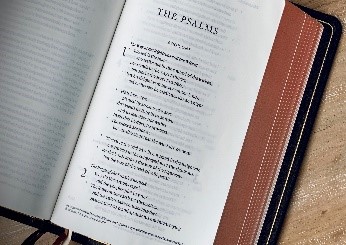
Being Real with God
A friend recently pointed me to a short You Tube video by N.T. Wright which I had not run across before. It was an encouragement to pray the Psalms. Though knowing many Christian saints of earlier generations have done so, I had never been able to get my head around the concept, and so never really looked into it. The Psalms are a wonderful resource for the justification of ‘being real’ with God and for that I have long appreciated them. Using them as a personal prayer book, not reading it as David’s prayer book, is a much different concept.

Dietrich Bonhoeffer is one who also used the psalms as his prayer book and he drew strength from them during his imprisonment and eventual execution by the Nazis. Reading through an essay he wrote on the subject, this comment jumped out at me: “It is often particularly striking and offensive to evangelical Christians that in the Psalms the innocence of devout people is spoken of at least as often as is their guilt.” I realised that I struggle with this—David often talks about his innocence, his righteousness, and in retrospect I have tended to gloss over those phrases not really knowing what to do with them—and I certainly couldn’t comfortably pray that way myself. It seems to ooze self-righteousness. But as Bonhoeffer points out “It is clear that a man can speak of his own innocence in a self-righteous way, but do we not also realize that a man can pray the most humble confession of sin very self-righteously? ...It is characteristic of the faith of the Christian that through God’s grace and the merit of Jesus Christ he has become entirely justified and guiItless in God’s eyes, so that ‘there is therefore now no condemnation for those who are in Christ Jesus.’” And I along with you, joyfully affirm Paul’s no condemnation statement as a doctrine of our faith. There is however, in my experience a vast spiritual/emotional difference between mentally knowing that, and being able to pray confidently to God with David: “I am blameless before (you) God; I have kept myself from sin.” Ps. 18:23 or 7:8 (NLT) “The Lord judges the nations. Declare me righteous, O Lord, for I am innocent, O Most High!” It is still much easier for me to read and pray the Psalms in which David expresses guilt and repentance. Yet, the reality of who I am in Christ says that I should be able to do both with equal comfort and fervour. Perhaps what my head totally believes--there is now no condemnation for those who are in Christ-- my heart is yet to fully comprehend. Thank you, God for the gift of innocence, and for your patience. And thank you that the ‘being real’ aspect of the Psalms includes our innocence in your presence through our Lord, Jesus Christ.
Psalms—The Prayer Book of the Bible; pgs. 52-53; D. Bonhoeffer; Augsburg Press 1974
Unsplash-- Tim Wildsmith